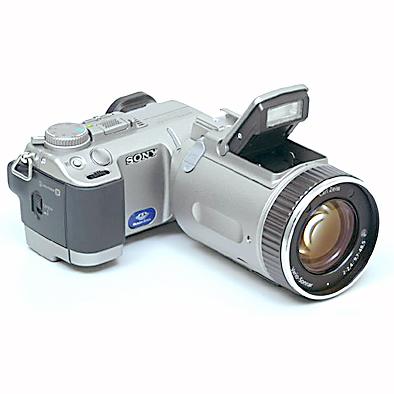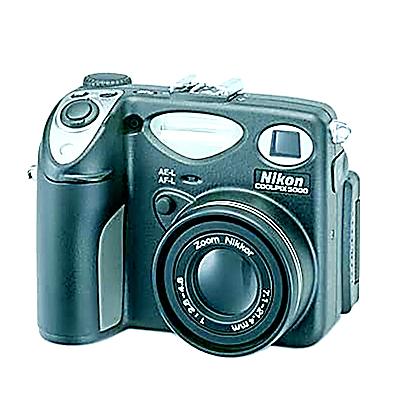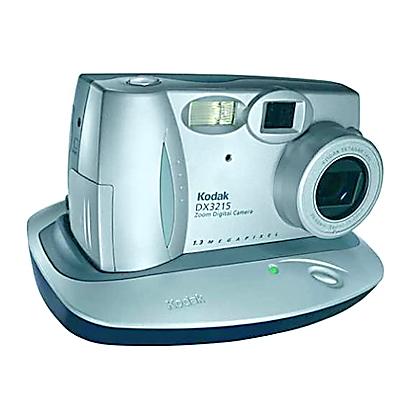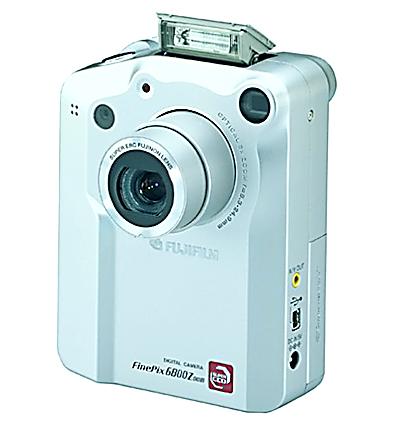Thanks to the technology industry downturn, digital camera companies are finally starting to offer more bang for your buck in terms of photo quality and added features for a lower price.
The biggest advantage to a digital camera over traditional, film-guzzling boxes, remains the convenience of seeing shots soon after they are taken and saving money on film developing. The ease of use, ability to send photos quickly to friends via e-mail, and no messing about with print photos, negatives and paying for processing -- not to mention losing photos to aging, water spillage and other hazards -- has spurred a buying spree on digital cameras this year. The result has been lower costs for better cameras.
Having said that, there are also strong reasons to look at a traditional film camera at the tail end of its life. The rise of the digital has helped drag down the cost of 35mm cameras so much you can get top notch cameras for next to nothing. And digitizing photos so they can be sent across the Internet to family and friends is no longer a hassle either.

PHOTO COURTESY OF SONY
Many film developing studios scan the prints onto a CD now and also offer digital camera users the chance to make prints out of digital photos. Traditional camera owners could also buy a scanner and digitize photos and negatives at home, as high-quality scanners have drastically fallen in price.
Most of the people surveyed for this report said their top priorities in buying a digital camera were picture quality and price. Digital camera picture quality is measured in pixels. The more pixels the higher the quality. For example, a camera with a resolution of 1280 pixels by 1024 pixels is referred to as a 1.3 megapixel camera. If you want to blow photos up to larger sizes on screen or for printing, higher resolution cameras are needed.
Printing images from a home computer is a different story, and not recommended. The cost of printer ink does not justify using a home computer to print photos unless absolutely necessary. Take it to a photo shop.

PHOTO COURTESY OF NIKON
Some digital camera owners say two important considerations are photo storage space and battery life. Some older model cameras run out of batteries after taking only 10 to 15 shots but newer models can take far more. It's important to ask if you are not sure. Newer digital cameras also come with rechargeable batteries instead of throw-aways, which usually last longer. Today, you can also buy extra batteries and disks to store photos on as well.
Buying the right camera, any kind, has also always been important for the huge amount of zoom offered in many brands. Some digital cameras do not offer a zoom function. Others come with extra lenses or the option to buy additional lenses to zoom in on people or objects -- another good reason to know why you want the camera in the first place.
Digital cameras also come with extras that traditional cameras cannot compete with. Most new digital cameras double as Web cams. Many also come with the ability to take short video clips. Almost all digital cameras these days come with flash, zoom capability, and with screens on the back where you can view photos right after they've been taken, discard them if you don't want them or show them to friends.

PHOTO COURTESY OF KODAK
Sony's DSC F707 camera, while a bit pricey, even comes with "night vision" as an option, taking photos without a flash but ending up with regular lighting great for night-time nature photography.
Probably the best thing about a digital camera is how easy it is to download photos into your computer and make changes like crop unsightly objects, adjust lighting, etc, and then quickly send them off to friends by e-mail.
Over the next few months, companies are set to launch a number of new products for use with digital cameras. Hewlett-Packard has just put out new printers that make print-quality photos out of digital pictures, and other gear is on the way. One way to take advantage of this trend is to see what you can get if you buy more than one gadget at a time. For example, Dell Computer was offering free digital cameras to new PC buyers last month. Some firms are bundling a digital camera with a printer and selling them as a pair instead of separately. At the Nova Plaza computer shopping area by the Taipei Main Railway Station, some companies were offering printers, digital cameras, scanners and CD-recordable drives to customers as a complete package. The CD-R drives are nice because you can send a bunch of pictures to friends all at once instead of clogging up e-mail lines with too many photos or just back up files in case of a computer virus or other problem. The drives can also help save space as digital photos can take a lot of computer memory.

PHOTO COURTESY OF FUJI

May 18 to May 24 Pastor Yang Hsu’s (楊煦) congregation was shocked upon seeing the land he chose to build his orphanage. It was surrounded by mountains on three sides, and the only way to access it was to cross a river by foot. The soil was poor due to runoff, and large rocks strewn across the plot prevented much from growing. In addition, there was no running water or electricity. But it was all Yang could afford. He and his Indigenous Atayal wife Lin Feng-ying (林鳳英) had already been caring for 24 orphans in their home, and they were in

On May 2, Chinese Nationalist Party (KMT) Chairman Eric Chu (朱立倫), at a meeting in support of Taipei city councilors at party headquarters, compared President William Lai (賴清德) to Hitler. Chu claimed that unlike any other democracy worldwide in history, no other leader was rooting out opposing parties like Lai and the Democratic Progressive Party (DPP). That his statements are wildly inaccurate was not the point. It was a rallying cry, not a history lesson. This was intentional to provoke the international diplomatic community into a response, which was promptly provided. Both the German and Israeli offices issued statements on Facebook

Even by the standards of Ukraine’s International Legion, which comprises volunteers from over 55 countries, Han has an unusual backstory. Born in Taichung, he grew up in Costa Rica — then one of Taiwan’s diplomatic allies — where a relative worked for the embassy. After attending an American international high school in San Jose, Costa Rica’s capital, Han — who prefers to use only his given name for OPSEC (operations security) reasons — moved to the US in his teens. He attended Penn State University before returning to Taiwan to work in the semiconductor industry in Kaohsiung, where he

President William Lai (賴清德) yesterday delivered an address marking the first anniversary of his presidency. In the speech, Lai affirmed Taiwan’s global role in technology, trade and security. He announced economic and national security initiatives, and emphasized democratic values and cross-party cooperation. The following is the full text of his speech: Yesterday, outside of Beida Elementary School in New Taipei City’s Sanxia District (三峽), there was a major traffic accident that, sadly, claimed several lives and resulted in multiple injuries. The Executive Yuan immediately formed a task force, and last night I personally visited the victims in hospital. Central government agencies and the